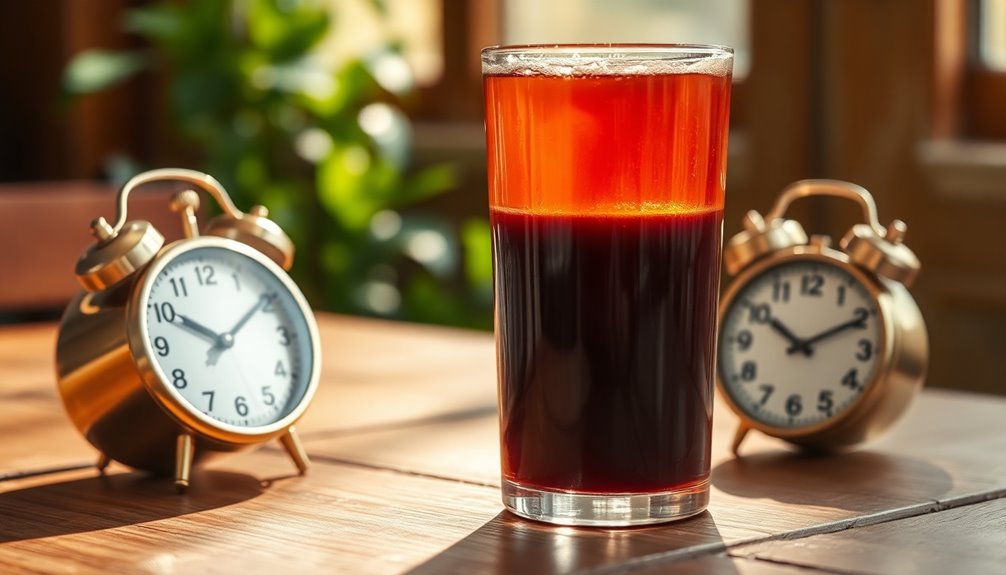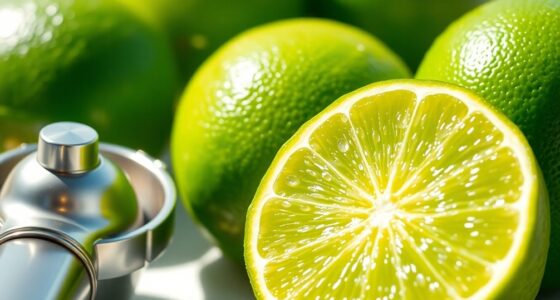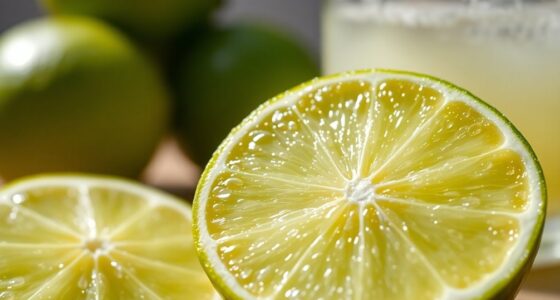The effects of prune juice can last in your system for up to 24 hours. After you consume it, you might feel the urge to go within 1-3 hours, depending on your digestive health and metabolism. Regular intake promotes more consistent bowel movements, and the sorbitol in prune juice helps soften stool. However, individual experiences may vary. If you're curious about how to optimize its benefits for your digestive health, there's more to learn about its effects and recommendations.
Key Takeaways
- Prune juice effects are typically felt within 1-3 hours after consumption.
- The duration of effects can last up to 24 hours.
- Individual digestive health influences how long prune juice lasts in the system.
- Regular intake leads to more consistent bowel movements over time.
- Overconsumption may lead to discomfort and alter the expected duration.

When you drink prune juice, you might wonder how long its effects last in your system. Prune juice is well-known for its ability to promote bowel movements, making it a popular choice for those seeking relief from constipation. Typically, you can expect to feel the effects of prune juice within 1-3 hours after consumption, but this can vary based on your individual digestive health and metabolism.
The key ingredient that makes prune juice effective is sorbitol. This natural sugar alcohol attracts water into the colon, which helps soften your stool and encourages regularity. When you consume prune juice, the sorbitol works to draw moisture from your body into your intestines, creating a more comfortable and easier passage for stool. This process not only helps with stool softening but also helps you achieve relief from constipation throughout the day.
In most cases, people report experiencing the positive effects of prune juice for up to 24 hours. However, the duration of these effects can depend on how much prune juice you drink. Experts recommend a daily intake of about 4-8 ounces for optimal results. If you stick to this recommended daily intake, your body may respond better, and you could experience more consistent bowel movements.
It's important to remember that every person's digestive system is different. While some individuals may feel the effects of prune juice almost immediately, others might take longer to notice any changes. Factors such as your overall digestive health, diet, and hydration levels can all play a role in how quickly you experience relief.
If your body is particularly sensitive or has been experiencing irregularity for a long time, it may take a bit longer to see the benefits from prune juice. After you drink prune juice, you might notice that your bowel movements become more regular. You could feel the urge to go within a few hours, but it's not uncommon for the effects to linger throughout the day.
As the sorbitol continues to do its job, you'll likely find that your stool becomes softer and easier to pass. This stool softening effect is what makes prune juice such a reliable choice for many people looking for a natural solution to constipation.
Frequently Asked Questions
How Long Does Prune Juice Affect You?
Prune juice affects you typically within 1-3 hours after you drink it, often leading to bowel movements.
You might notice improved regularity if you consume it consistently over several days. Individual responses vary; some people experience results quickly, while others might take longer.
If you drink 4-8 ounces daily, you're generally safe and can maintain good digestive health. The natural components help promote regularity for up to 24 hours after consumption.
How Long Does Prune Juice Take to Clean You Out?
When you drink prune juice, it typically takes about 1 to 3 hours to clean you out, depending on your digestive system. However, this timeframe can vary from person to person, as individual digestive systems may react differently to the laxative effects of prune juice. It’s interesting to note how prune juice affects babies; parents often use it as a gentle remedy for constipation due to its natural properties. Always consult a pediatrician before introducing new foods or beverages to an infant’s diet to ensure their safety and well-being.
The high sorbitol content works as a natural laxative, drawing water into your colon.
If you're seeking quicker results, consider having it before bed; this way, it can do its job overnight, helping you feel relief by morning.
Does Prune Juice Clean Out Your System?
Yes, prune juice can help clean out your system.
It's packed with sorbitol, a natural laxative that softens stool and attracts water to your colon. When you drink it, you might notice bowel movements occurring within a few hours.
Regular consumption can improve your bowel regularity, leading to fewer hard stools.
Just remember to drink it in moderation, as too much can cause discomfort like diarrhea or gas.
What Happens to Your Stomach When You Drink Prune Juice?
When you drink prune juice, you may notice your stomach feels lighter, your digestion improves, and your bowel movements become more regular.
The sorbitol in the juice draws water into your colon, softening your stool and easing its passage.
You'll also stimulate the release of digestive enzymes, enhancing nutrient absorption.
Over time, regular consumption can lead to better gut health, helping you feel more comfortable and maintaining a balanced digestive system.
Conclusion
In conclusion, prune juice zips through your system like a rocket-powered rollercoaster! You might feel its effects within a few hours, but it can linger for up to 24 hours, turning your digestive track into a thrilling amusement park ride. So, when you sip that sweet elixir, get ready for a whirlwind adventure. Just remember, it's not just juice; it's a turbocharged ticket to a happy, healthy gut! Buckle up and enjoy the ride!
Cindy thoroughly researches juicing trends, techniques, and recipes to provide readers with practical advice and inspiration. Her writing style is accessible, engaging, and designed to make complex concepts easy to understand. Cindy’s dedication to promoting the advantages of juicing shines through her work, empowering readers to make positive changes in their lives through the simple act of juicing.











